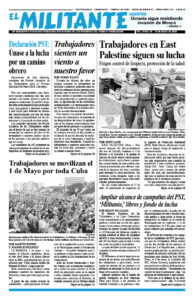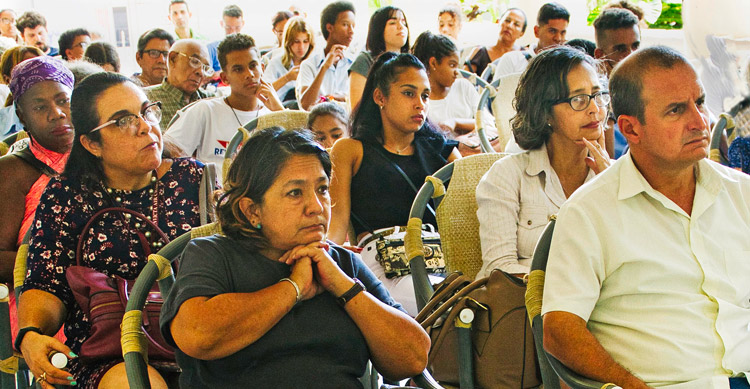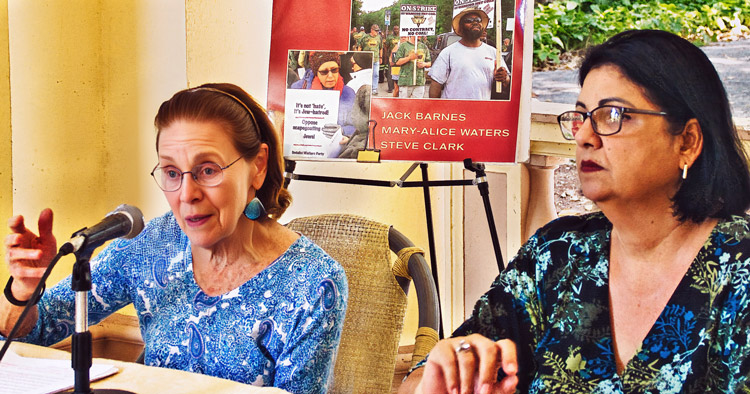HAVANA — Amid preparations by working people across Cuba to celebrate May 1, International Workers Day, a special event was held here to discuss a new book by Pathfinder Press, The Low Point of Labor Resistance Is Behind Us: The Socialist Workers Party Looks Forward by Jack Barnes, Mary-Alice Waters and Steve Clark.
Waters, a National Committee member of the SWP and president of Pathfinder Press, was the featured speaker. The April 25 book presentation was initiated by the Central Committee of the Communist Party of Cuba and held at the national headquarters of the Cuban Institute for Friendship with the Peoples (ICAP). Noemí Rabaza, first vice president of ICAP, spoke alongside Waters and chaired the meeting.
Leima Martínez, ICAP’s director for North America, welcomed the audience, which included José Ángel Maury, Americas coordinator of the Central Committee’s international relations department; Olga Yipsi González from the Central Committee’s ideological department; and other party representatives.
Martínez took special note of the presence of Commander Víctor Dreke, who fought in the revolutionary struggle that overthrew the Batista dictatorship in 1959. From 1962 to 1965 Dreke commanded the forces in the Escambray mountains of central Cuba that defeated counterrevolutionary bands supported by Washington. In 1965 he was second in command to Ernesto Che Guevara in the Cuban internationalist mission aiding anti-imperialist combatants in the Congo. And in 1966-68 he commanded the Cuban volunteers who fought alongside pro-independence forces in Guinea-Bissau led by Amilcar Cabral. Few of the young people at the meeting had ever met Dreke, and they were excited to learn about his revolutionary record.
The audience of more than 50 included leaders of Cuba’s Union of Young Communists (UJC), the Federation of University Students (FEU), a representative of the Fidel Castro Center, and a large participation from the Federation of Secondary School Students (FEEM).
In introducing Waters, Rabaza thanked the Socialist Workers Party for its contribution to work in defense of the Cuban Revolution, including its role at the U.S.-Cuba Normalization Conference that took place in New York in March, where Rabaza led the Cuban delegation. Pathfinder, she said, “has published numerous books that tell the truth about our country” in face of Washington’s implacable economic war.
Workers in Cuba are celebrating May Day “amid the difficulties imposed by the worldwide economic crisis,” Rabaza said. “We are convinced the international workers movement can be built” as workers in countries around the world resist these conditions.
The Low Point of Labor Resistance Is Behind Us “highlights the struggles of the working class,” she noted. “It defends Marxism and unity in action against imperialism.”
Stakes in fight for workers power
“We live in the imperialist epoch, at a time when the world order imposed by the victors in the Second World War is unraveling, accelerated by the first major land war in Europe in eight decades,” Waters told the audience.
“Amid the crises, conflicts and wars that are coming, one thing is certain. Another world war of unimaginable destruction will be unleashed on humanity unless the working class and its allies develop the consciousness and confidence that we must take the power to wage war out of the hands of the capitalist rulers in the U.S. and other imperialist countries.”
This is not a reason to despair, the SWP leader said. “That future isn’t inevitable. It depends on the actions of the international working class and its vanguard. It depends on us,” on working people in the U.S., Cuba and worldwide.
Waters briefly highlighted some of the main points of the resolution adopted by the Socialist Workers Party at its national convention last December, which is the centerpiece of the new book.
She drew attention to its concluding section on the need to forge a revolutionary workers party. “Only the working class has the social and economic power to lead the battles necessary to establish a government that will defend the interests of working people,” she said.
“For us, defense of Cuba’s socialist revolution is not just an act of international working-class solidarity,” Waters said. “It’s inseparable from a revolutionary course in the United States.”
The hatred, fear and lies that the U.S. ruling class directs against the Cuban people “are an extension of their hatred, fear, and lies about the toilers in the United States.” They discount the revolutionary capacities of working people at home as much as they discount those of the workers and farmers in Cuba. “In both cases they are wrong.”
Interest in U.S. workers’ fights
In the discussion period, Luis González Méndez, a 12th grade student and president of the FEEM in Havana province, said he welcomed the opportunity to learn more about the conditions and struggles of working people in the United States. “We know the working class there faces problems, but we only see them from afar,” he said.
Raúl Alejandro Matos, a 10th grader and president of the FEEM in Havana’s La Lisa neighborhood, asked what is the main concern of workers in the United States today.
Above all, Waters replied, “it’s the uncertainty about the future that working people and their families face. For decades the bosses have been on a brutal offensive to increase their profit rates. In one industry after another, the owners have imposed speedup and other measures that disregard workers’ safety and intensify exploitation.” As a result, she said, millions are “looking for ways to respond to these attacks.”
Speaking from the floor, Angela Nelson, a freight rail conductor and member of the SWP, gave examples of recent strikes and union struggles in the U.S., including for wages to keep up with inflation and against inhumane work schedules. Nelson explained how Congress and the White House intervened in December on behalf of rail bosses to bar a strike and impose a contract workers had rejected. She also described discussions among working people about the ongoing consequences of the train derailment and toxic fire in East Palestine, Ohio.
“We find more people open to discussing why this is happening and what to do,” Nelson said. “A growing number realize neither the Democratic nor the Republican Party offers us any solutions, and that workers need to organize in our own interests.”
Róger Calero, a leader of the SWP in New York and former meatpacking worker, expanded on what Waters had said about the centrality of defending protections and freedoms guaranteed by the U.S. Constitution in face of assaults by the federal government and the Democratic and Republican parties.
Workers, he said, should never applaud attempts by figures in the capitalist government to use the police and courts against their political opponents, such as the Democrats’ multiple legal assaults on Donald Trump.
“If they do that to an ex-president, you know they’ll try to use those same methods against us,” Calero said. Today, he noted, the federal government is going after leaders of the African People’s Socialist Party, four of whom were recently charged with “conspiring” to act as “unregistered foreign agents.” The FBI has also sought to interrogate members of a Cuba solidarity brigade in Puerto Rico.
“This is an important discussion, because conditions are difficult for workers all over the world,” Rabaza said.
She noted that in Cuba, in contrast with capitalist countries, workers are backed by their government, which defends their rights. The working class in Cuba is leading the fight to confront the economic problems we face. “We can’t lose hope, we can’t lose our faith in the struggle,” Rabaza said. “That’s what this book points to.”
“What Noemí says is important,” Waters said. “Working people in capitalist societies are taught we don’t have the power to change things and must accept that.” But it’s not true, she added. “It’s why the example of Cuba’s socialist revolution remains a beacon throughout the world. In Cuba, workers and farmers took power out of the hands of a capitalist ruling class fully backed by U.S. imperialism and established a government that serves the interests of working people.
“That changed everything for us in the United States too,” Waters said. It renewed prospects for building a revolutionary workers vanguard capable of leading the exploited and oppressed majority to power in the U.S.” That perspective and the defense of the Cuban Revolution are intertwined.
“Alone we will be defeated. Fighting together, we can have much more than hope — we can win,” she concluded.
After the program, many in the audience went to the Pathfinder book table to get The Low Point of Labor Resistance Is Behind Us and other titles on revolutionary struggles. Several people said they especially appreciated the concrete descriptions given during the discussion about what working people in the U.S. face and how they are responding.



